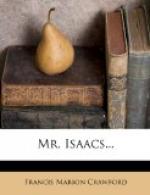I presume that the periodical manifestations of religious belief to which I refer are intimately and indissolubly connected with the staid and funereal solemnity which marks an Englishman’s dress, conversation, and conduct on Sunday. He is a different being for the nonce, and must sustain the entire character of his dual existence, or it will fall to the ground and forsake him altogether. He cannot take his religion in the morning and enjoy himself the rest of the day. He must abstain from everything that could remind him that he has a mind at all, besides a soul. No amusement will he tolerate, no reading of even the most harmless fiction can he suffer, while he is in the weekly devotional trance.
I cannot explain these things; they are race questions, problems for the ethnologist. Certain it is, however, that the partial decay of strict Sabbatarianism which seems to have set in during the last quarter of a century has not been attended by any notable development of power in English thought of that class. The first Republic tried the experiment of the decimal week, and it was a failure. The English who attempt to put off even a little of the quaint armour of righteousness, which they have been accustomed to buckle on every seventh day for so many generations, are not so successful in the attempt as to attract many to follow them. They are not graceful in their holiday gambols.
Meditating somewhat on this wise I lay in my long chair by the open door that Sunday morning in September. It was a little warmer again and the sun shone pleasantly across the lawn on the great branches and bright leaves of the rhododendron. The house was very quiet. All the inmates were gone to the church on the mall, and the servants were basking in the last few days of warmth they would enjoy before their masters returned to the plains. The Hindoo servant hates the cold. He fears it as he fears cobras, fever, and freemasons. His ideal life is nothing to do, nothing to wear, and plenty to eat, with the thermometer at 135 degrees in the verandah and 110 inside. Then he is happy. His body swells with much good rice and dal, and his heart with pride; he will wear as little as you will let him, and whether you will let him or not, he will do less work in a given time than any living description of servant. So they basked in rows in the sunshine, and did not even quarrel or tell yarns among themselves; it was quiet and warm and sleepy. I dozed lazily, dropped my book in my lap, struggled once, and then fairly fell asleep.
I was roused by Kiramat Ali pulling at my foot, as natives will when they are afraid of the consequences of waking their master. When I opened my eyes he presented a card on a salver, and explained that the gentleman wanted to see me. I looked, and was rather surprised to see it was Kildare’s card. “Lord Steepleton Kildare, 33d Lancers “—there was no word in pencil, or any message. I told Kiramat to show the sahib




